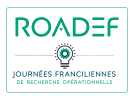Black-box Optimization
Date
This day took place
Tuesday, the 26 November 2024
Tuesday, the 26 November 2024
Place
Sorbonne Université, 4 Place Jussieu 75005 Paris, LIP6, room 25–26-105
Program of the day
09h00-09h30
Reception
09h30-10h30
Tutorial: Black-box optimization in theory and practice
Abstract : Many real-world optimization challenges are significantly harder than the scenarios that can be rigorously analyzed by mathematical means. In addition, practitioners often lack time and resources to develop problem-specific solution strategies; they therefore need to rely on general-purpose optimization heuristics such as local search variants, evolutionary and genetic algorithms, Bayesian optimization techniques, and similar. Unfortunately, practitioners often choose and apply these algorithms without much guidance from the scientific community.
With this presentation, we will discuss how (theoretical and empirical) research can be used to develop more principled usage of optimization heuristics, whether involving manual or purely data-driven selection strategies.
10h30-11h00
Coffe break
11h00-11h30
Bayesian Quality Diversity approaches for constrained optimization problems with mixed variables
Abstract : Complex engineering design problems, such as those involved in aerospace, civil, or energy engineering, require the use of numerically costly simulation codes in order to predict the behavior and performance of the system to be designed. To perform the design of the systems, these codes are often embedded into an optimization process to provide the best design while satisfying the design constraints. Recently, new approaches, called Quality-Diversity, have been proposed in order to enhance the exploration of the design space and to provide a set of optimal diversified solutions with respect to some feature functions. These functions are interesting to assess trade-offs. Furthermore, complex engineering design problems often involve mixed continuous, discrete, and categorical design variables allowing to take into account technological choices in the optimization problem. This talk will discuss Quality-Diversity methodologies based on mixed continuous, discrete and categorical Bayesian optimization strategy. These approaches allow to reduce the computational cost with respect to classical Quality - Diversity approaches while dealing with discrete choices and constraints. The performance of the methods will be discussed on a benchmark of analytical problems as well as on an industrial design optimization problem dealing with aerospace systems.
11h30-12h00
Black-box optimization with hidden constraints
Abstract : Real industrial studies often give rise to optimization problems involving time-consuming complex simulators that can produce some failures or instabilities for some input sets: for instance, convergence issues of the numerical scheme of partial derivative equations. The set of inputs corresponding to failures is often not known a priori and corresponds to a hidden constraint, also called a crash constraint. Since the observation of a simulation failure might be as costly as a feasible simulation, we seek to learn the feasible region to guide the optimization process in areas without simulation failures. Therefore, we propose to couple some black-box optimization methods with a Gaussian process classifier active learning method to learn the crash domain. Several coupling strategies are proposed and compared in terms of accuracy of the solution and budget of (crashed) simulations. At last, an application of the developed approach for wind turbine reliable design is presented.
Joint work with Morgane Menz and Miguel Munoz Zuniga.
12h00-14h00
Lunch break
14h00-14h30
Random subspace approaches in derivative-free optimization
Abstract : Derivative-free algorithms seek the minimum of a given function based only on function values queried at appropriate points. Although these methods are widely used in practice, their performance is known to worsen as the problem dimension increases. Recent advances in developing randomized derivative-free techniques have tackled this issue by working in low-dimensional subspaces that are drawn at random in an iterative fashion. The connection between the dimension of these random subspaces and the algorithmic guarantees has yet to be fully understood. This talk will review several strategies to select random subspaces within a derivative-free algorithm. We will explain how probabilistic convergence rates can be obtained for such a method, then provide numerical evidence that using low-dimensional random subspaces leads to the best practical performance.
14h30-15h00
Black Box Optimization problems in automotive design
Abstract : The design of an automotive vehicle is a complex engineering problem involving various disciplines such as occupant safety, acoustic quality, vehicle weight, and aerodynamics.
Stellantis tackles these complexities through multidisciplinary Black Box Optimization studies based on costly numerical simulations conducted throughout the design cycle.
This presentation will illustrate the engineering challenges with examples, showcase the state-of-the-art algorithms employed by Stellantis, and discuss emerging challenges such as high dimensionality, increased number of constraints, and the integration of Deep Learning-based surrogates.
15h00-15h30
A trust-region framework for derivative-free mixed-integer optimization
Abstract : In this talk we will discuss the development of a framework for the optimization of black-box mixed-integer functions subject to bound constraints. This methodology is based on the use of tailored surrogate approximations of the unknown objective function, in combination with a trust-region method. Such surrogate models adapt the concept of fully-linear and fully quadratic models into the mixed-integer setting. We also describe the different challenges faced on the mixed-integer derivative-free optimization such as the definition of a proper mixed-integer minimizer and the required conditions to guarantee algorithmic convergence. Finally, we present potential improvements to our method that will enable it to reuse previous function calls more efficiently. Joint work with Giacomo Nannicini, Emiliano Traversi and Roberto Wolfler Calvo.
15h30-16h00
Coffee break
16h00-16h30
Optimisation de fonctions boîtes noires avec Hexaly
Abstract : Dans les problèmes d'optimisation de fonctions boîtes noires, la forme exacte de la fonction
objective et des contraintes n'est pas connue, et chaque évaluation d’une nouvelle solution est coûteuse en termes de temps ou de mémoire. Le solveur Hexaly propose une approche d'optimisation de ces problèmes basée sur des modèles de fonctions de base radiale (RBF), permettant de réduire le nombre d’évaluations en choisissant judicieusement les points à évaluer. L’algorithme, combinant des phases d’exploration et d’intensification, optimise ainsi le budget limité d’évaluation. Hexaly intègre également des contraintes analytiques et boîtes noires, souvent présentes dans les applications industrielles, et offre la possibilité d’optimiser plusieurs objectifs boîte noire. Les résultats obtenus sont comparables à ceux d'autres solveurs spécialisés comme RBFOpt et NOMAD, illustrant l'efficacité d’Hexaly dans des cas d'applications réels.
16h30-17h00
How can I use Artelys Knitro, a derivative based nonlinear optimization solver, to efficiently solve black-box models?
Abstract : Artelys Knitro is a derivative based nonlinear optimization solver. In this talk, we will highlight how such solvers can prove to be particularly efficient on black box models relying on several key features and algorithms. This presentation explores the techniques employed by Knitro to address Black Box & Derivative Free Optimization (BBO-DFO) challenges, including adaptive tuning and finite-difference methods for gradient estimation, enabling optimization where derivatives are unavailable or costly to compute. Practical results on the black box optimization competition will illustrate the solver's capabilities, demonstrating how Artelys Knitro enables efficient and accurate optimization in unknown nonlinear (potentially non-differentiable) landscapes.


